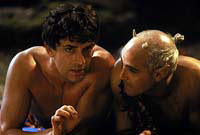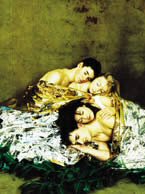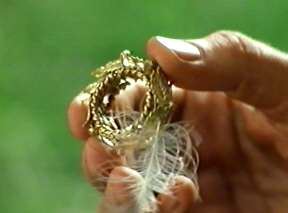
ACT IV
SCENE i
Titania entertains Bottom and, again, Bottom is having a grand time joking with the fairies. "Mounsieur Cobweb, good mounsieur, get you your weapons in your hand, and kill me a red-hipped humble-bee on the top of a thistle; and, good mounsieur, bring me the honey-bag" (IV.i.10-13). [Thistle is Scottish, and Mary, Queen of Scots was executed in a red dress. But B? Burghley? The money-bag makes sense there, and maybe the sarcastic "humble." Was Burghley "on the top of a thistle" in being on top of the succession issue (thistle being a strong Scottish association)? How was he "red-hipped"?]
"Methinks I have a great desire to a bottle [bundle] of hay" (IV.i.32-33). With Titania professing her love, the two retire to her bower: "it remains ambiguous exactly what transpires there amidst the nodding violet, luscious woodbine, and sweet musk roses" (Bloom 162-163).
"Bottom with an ass's head is more like himself than before, just as Demetrius, his eyes anointed with the magic love-juice and imagining himself in love with Helena, is more like himself than he was before" (Garber 218).

|
Oberon admits to Puck, "Her dotage now I do begin to pity" (IV.i.47).
He tells Puck he has been given the changeling child: "And now I have
the boy, I will undo / This hateful imperfection of her eyes" (IV.i.62-63).
All four Athenian youths are asleep, so Puck needs to restore that batch:
"May all to Athens back again repair, / And think no more of this night's
accidents / But as the fierce vexation of a dream" (IV.i.67-69). Oberon
gives Titania an antidote, reciting an acknowledgment of the myth of the
Virgin Queen: "Dian's bud o'er Cupid's flower / Hath such force and blessed
power" (IV.i.73-74). When Titania wakes, she immediately remarks, "My Oberon,
what visions I have seen! / Methought I was enamor'd of an ass" (IV.i.76-77).
The royal fairy couple are reconciled: "new in amity" (IV.i.87). "For all
the literary mastery of the play, its principal turning-point is the wordless
dance that marks their reconciliation" (Wells 66).
|
The Athenian court personnel are hunting. Theseus says:
We will, fair queen, up to the mountain's top,Hippolyta confirms the audio phenomenon: she "was with Hercules and Cadmus once" (IV.i.112) on a hunt, and
And mark the musical confusion
Of hounds and echo in conjunction.
(IV.i.109-111)
The skies, the fountains, every region nearGoddard sees this "digression" as the key to the play: "it is as nearly perfect a metaphor as could be conceived for A Midsummer Night's Dream itself and for the incomparable counterpoint with which its own confusions and discords are melted into the 'sweet thunder' of a single musical effect" (Goddard, I 75). With some distance and perspective, you hear harmony.
Seem all one mutual cry. I never heard
So musical a discord, such sweet thunder.
(IV.i.116-118)
|
The very incongruities, anachronisms, contradictions, and impossible juxtapositions of A Midsummer Night's Dream, and the triumphant manner in which the poet reduces them to a harmony, are what more than anything else make this play a masterpiece. (Goddard, I 76)The hunting party stumbles upon the youths. Theseus offers a "benign supposition" (Garber 223): "No doubt they rose up early to observe / The rite of May" (IV.i.132-133). They don't understand what has happened to affect "this gentle concord" (IV.i.143) -- probably just midsummer madness. Egeus' plans are foiled by the happy pairings of the couples, and he sputters in anger, but Demetrius seems reformed, and Theseus decides they'll hear more of this "anon" (IV.i.178). All are to return for a triple marriage ceremony. "Away with us to Athens. Three and three, / We'll hold a feast in great solemnity" (IV.i.184-185). The lovers are confused but happy. Demetrius, who is technically still under the spell, right?, asks the others, "Are you sure / That we are awake? It seems to me / That yet we sleep, we dream" (IV.i.192-194). But, "Does it make any difference at all who marries whom?" (Bloom 163).
|

|
Bottom "awakens." He thinks he is still in the middle of the rehearsal but gradually comes into possession of his faculties:

|
I have had a most rare vision. I have had a dream, past the wit of man to say what dream it was. Man is but an ass, if he go about t' expound this dream. Methought I was -- there is no man can tell what. Methought I was, and methought I had -- but man is but a patch'd fool, if he will offer to say what methought I had. The eye of man hath not heard, the ear of man hath not seen, man's hand is not able to taste, his tongue to conceive, nor his heart to report, what my dream was. I will get Peter Quince to write a ballet of this dream. It shall be called "Bottom's Dream," because it hath no bottom; and I will sing it in the latter end of a play, before the Duke. Peradventure, to make it the more gracious, I shall sing it at her death. (IV.i.204-219)
|
This includes a muddled misquotation of a Pauline letter (I Corinthians 2:9-10; check out the previous verse). More importantly, it is Bottom's sense in this speech that he has had an experience greater than he can comprehend "that makes this role not just for a fine comedian but for a great actor" (Wells 68). "For what Shakespeare has caught here in perfection is the original miracle of the Imagination, the awakening of spiritual life in the animal man" (Goddard, I 80), or "an apocalyptic, unfallen man, whose awakened senses fuse in a synesthetic unity" (Bloom 167; cf. Garber 232). Truly, though, "De Vere's own rumored days of flirtations and privy chamber sighs shared with the queen of England in 1573 must have seemed, two decades later, as strange as A Midsummer Night's Dream's vision of a faerie queen tumbling in the hay with an ass" (Anderson 277).
SCENE ii
With Bottom missing in action, the players mourn their lost opportunity. They eulogize their comrade, though Quince calls him "a very paramour for a sweet voice" (IV.ii.11-12). Flute corrects him: "You must say 'paragon.' A paramour is (God bless us!) a thing of naught" (IV.ii.13-14). But Bottom finally does return: "Masters, I am to discourse wonders; but ask me not what; for if I tell you, I am no true Athenian" (IV.ii.30-31) -- so secrecy about having an affair with the Fairy Queen = state loyalty. Bottom brings good news: "our play is preferr'd" (IV.ii.39). He advises: "eat no onions nor garlic, for we are to utter sweet breath; and I do not doubt but to hear them say, it is a sweet comedy" (IV.ii.42-44).